JEE Advanced is one of the most competitive engineering entrance exams in India, requiring strategic preparation and a deep understanding of core concepts across Physics, Chemistry, and Mathematics.
Major Challenges Before JEE Advanced:
- Maintaining Focus and Staying Calm for 6 Hours
The six-hour duration of the exam is mentally taxing. Staying calm and focused throughout is crucial and easier said than done.
Example: It’s common for aspirants to lose focus midway through the second paper due to fatigue. Practicing mock tests in similar conditions is important to overcoming this. - Applying Multiple Concepts in a Single Question
Advanced-level questions often integrate concepts from various topics. This requires a deep understanding and the ability to connect ideas across subjects. - Time Management During the Exam
Completing the questions you’re capable of solving before time runs out is vital. It’s easy to get stuck on challenging problems and lose precious minutes. - Avoiding Silly Mistakes
Silly mistakes can be your biggest roadblock. Identifying and rectifying them early is essential for maximizing your score.
Key Considerations for JEE Advanced 2025 Aspirants:
1. Strengthen Core Concepts
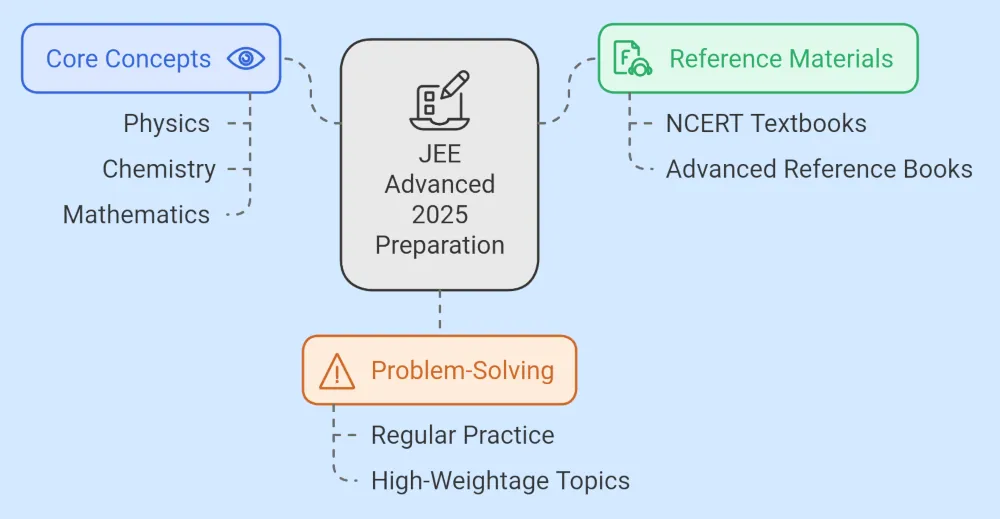
A solid foundation in Physics, Chemistry, and Mathematics is crucial for JEE Advanced. Begin by thoroughly understanding the basic concepts and theories from NCERT textbooks, as they form the backbone of the syllabus.
Reference Books: Use standard reference books for deeper understanding:
- Physics: H.C. Verma, D.C. Pandey
- Chemistry: O.P. Tandon, N.C.E.R.T.
- Mathematics: R.D. Sharma, Cengage Series
Once the basics are clear, move on to chapter-wise preparation:
- Identify Weak Areas:
Make a list of chapters or concepts you feel less confident about, whether due to insufficient practice, unclear fundamentals, or complexity. Prioritize these based on their weightage in JEE Advanced and start revising them systematically. - Targeted Practice:
Use your preparation notes and solve star-marked questions from your reference books for these chapters. Work on new questions only if you find gaps in your understanding. A practical checkpoint is being able to confidently solve past JEE questions from those chapters. - Cross-Topic Integration:
Pay special attention to chapters that might appear less important but contribute to questions involving multiple concepts. For instance, questions from one subject often involve interlinked concepts from another, so don’t skip secondary topics that may cost you marks indirectly.
2. Create a Structured Study Plan

Time management plays an important role in JEE preparation. Draft a realistic and detailed study schedule that allocates specific time slots for each subject, revision, and practice tests.
Divide the syllabus into smaller, manageable portions and set daily or weekly goals to track progress. Stick to your schedule consistently, but remain flexible enough to make adjustments as needed.
3. Practice Regular Mock Tests – Building Exam Temperament
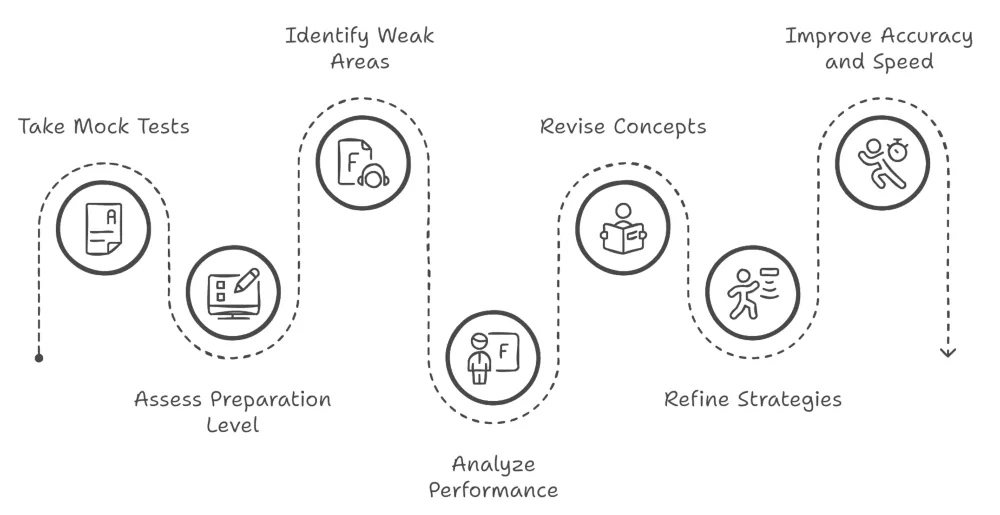
Mock tests are an indispensable part of preparation for JEE Advanced. They help simulate the exam environment, improve time management, and build confidence.
- Simulate Exam Conditions:
Practice mock tests at the exact timings of the actual exam (9–12 and 2–5). Mimicking the exam schedule helps train your mind to stay focused during these critical hours. - Systematic Analysis of Mock Tests:
After each test, dedicate time to analyzing your performance. Jot down the types of mistakes you made, whether due to calculation errors, misreading questions, or conceptual misunderstandings. Keep a log of these mistakes and review them before subsequent tests. - Minimize Silly Mistakes:
Repeated exposure to timed tests and mindful error analysis will gradually reduce silly mistakes. Consciously remind yourself of common errors before each test to avoid repeating them. - Leverage Previous Year’s Papers:
Solve past JEE Advanced papers thoroughly—both subjective and objective formats. This practice provides invaluable insight into the exam pattern, level of difficulty, and common traps.
Take full-length mock tests periodically to assess your preparation level and identify weak areas. Analyze your performance after each test to understand mistakes, revise concepts, and refine your strategies. Focus on improving accuracy and speed over time.
4. Seek Guidance and Support
JEE Advanced is a challenging exam, and seeking guidance can provide valuable insights. Join coaching programs or online courses if needed, as they often provide structured study plans and expert mentorship.
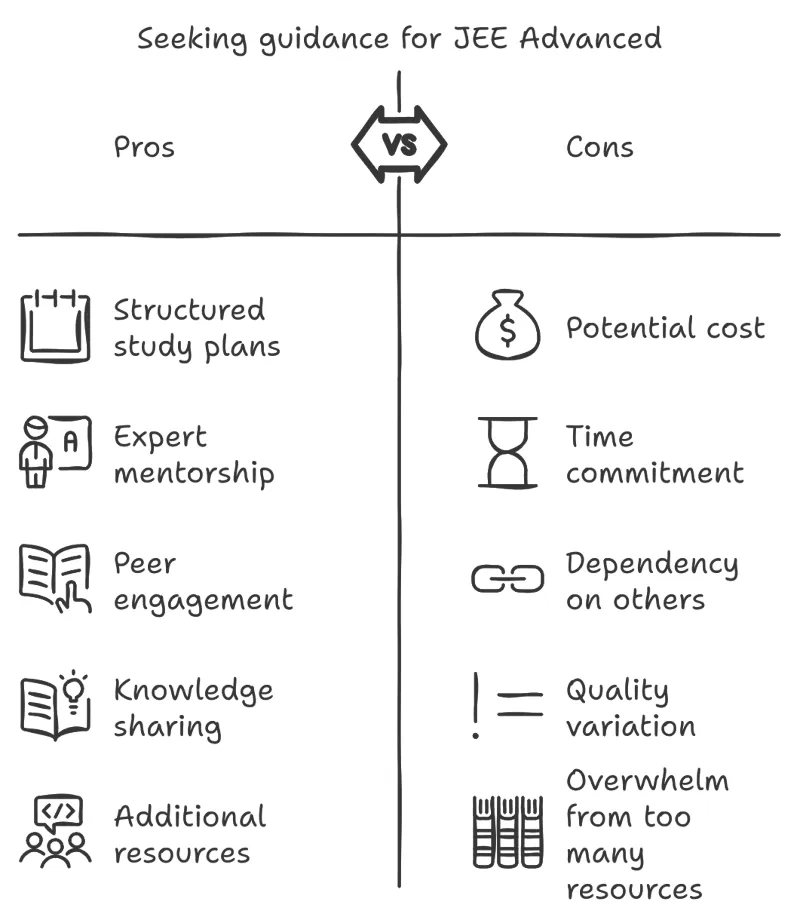
Maximizing Practice Resources
- Limit Resource Overload:
Stick to a curated set of resources, including your class notes, key reference books, and one or two question banks. Overloading yourself with material will dilute your focus. - Mock Tests and Review Packages:
If possible, use review packages or advanced-level question banks from reputable coaching institutes. FIITJEE’s Review Packages, for example, are highly relevant and challenging. However, avoid overly advanced materials like GMP unless you’re consistently acing JEE-level questions with ease.
Engage with peers in study groups to share knowledge, discuss challenging problems, and stay motivated. Use online forums and educational platforms to clarify doubts and access additional resources.
5. Focus on Mental and Physical Well-being
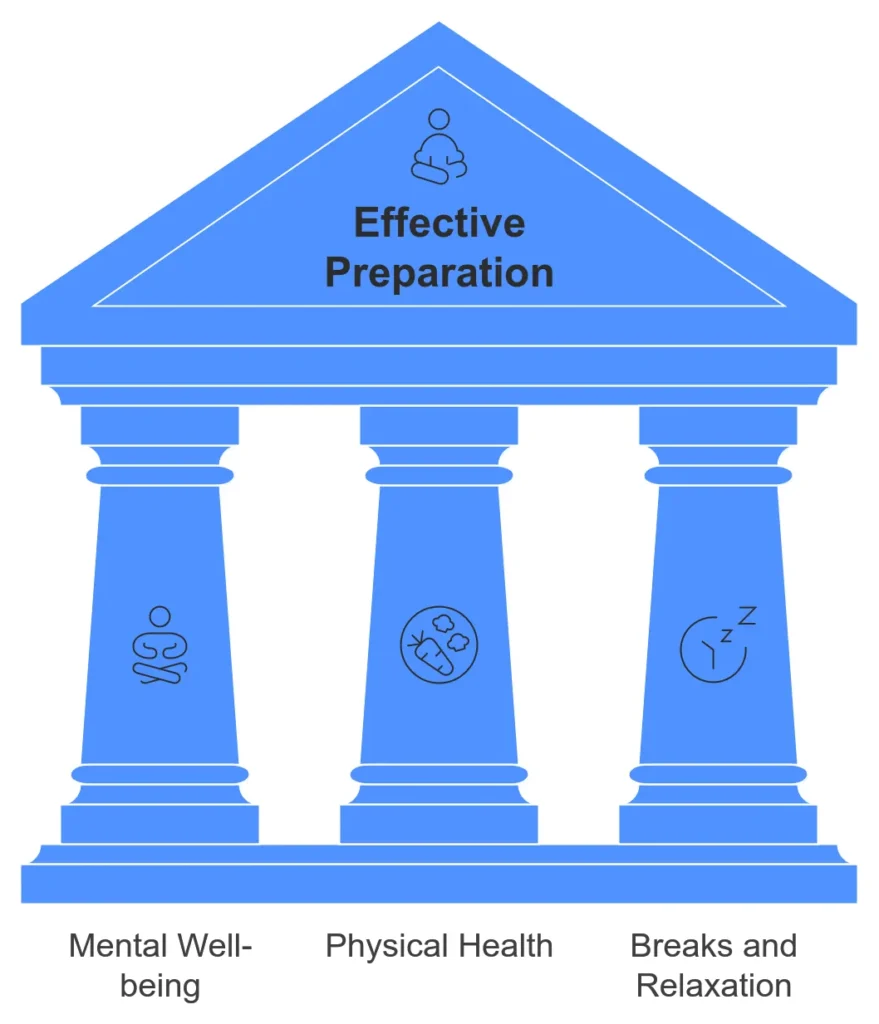
A focused mind and a healthy body are essential for effective preparation. Take regular breaks during study sessions to avoid burnout and maintain productivity. Ensure you get adequate sleep, eat nutritious food, and engage in light physical activities to maintain overall well-being.
6. Final Lap: Revision and Mental Preparation
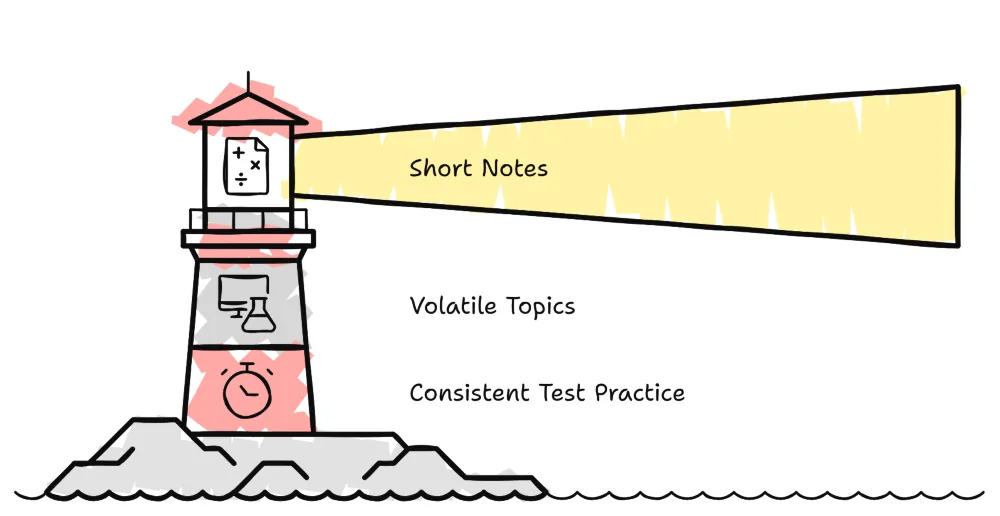
- Short Notes for Quick Revision:
In the final weeks, rely on concise notes summarizing all key concepts, formulas, and tricks. Aim for 1–2 pages per chapter for quick and efficient revision. - Volatile Topics:
Revise topics that require frequent memory reinforcement, such as organic chemistry reactions or specific mathematical theorems, more often to keep them fresh. - Consistent Test Practice:
In the last month, take mock tests daily, followed by immediate analysis. The focus should be on fine-tuning your exam strategy and reinforcing confidence.
7. Recommended Resources for JEE Adnvaced Preparation
- Books:
- Physics: H.C. Verma’s Concepts of Physics and I.E. Irodov’s Problems in General Physics.
- Chemistry: O.P. Tandon, Morrison & Boyd, and J.D. Lee.
- Mathematics: R.D. Sharma, M.L. Khanna, and A. Das Gupta.
- Online Platforms:
- Utilize online resources such as NTA mock tests, YouTube tutorials, and interactive platforms like Embibe and Vedantu.
JEE Advanced 2025 Syllabus
The syllabus for JEE Advanced 2025 remains the same as for 2024. It is crucial to focus on fundamental concepts and advanced applications in:
- Physics: Mechanics, Thermodynamics, Optics, Modern Physics, and Electricity & Magnetism.
- Chemistry: Physical, Organic, and Inorganic Chemistry, covering topics like thermodynamics, coordination compounds, and biomolecules.
- Mathematics: Algebra, Trigonometry, Calculus, and Coordinate Geometry.
For a detailed syllabus, refer ___
Conclusion – JEE Advanced Preparation
Stay Calm and Focused
The ultimate determinant of success in JEE Advanced is not just knowledge but the ability to perform under pressure. Stay calm, focused, and adaptable on exam day. Trust your preparation, avoid overthinking, and tackle questions methodically. Remember, every mark counts, and even minor improvements in your approach can make a big difference in your final rank.
Key Takeaways
- Start by addressing weak areas but avoid going too deep into less important topics.
- Develop and practice exam temperament through mock tests under realistic conditions.
- Solve previous year’s JEE questions religiously-they’re the best resource for understanding the exam’s complexity.
- Don’t forget short notes-they’re invaluable for last-minute revisions.
- Stay calm, trust your preparation, and focus on minimizing errors.
Good Luck!
Feel free to ask any questions or share your thoughts-happy to help!
Frequently Asked Questions – JEE Advanced Preparation
If you cannot cover a high-weightage topic, focus on learning other areas where you’re stronger. Maximize your accuracy in these sections and learn the basics of the missed topic to attempt straightforward questions. Strategic question selection during the exam can help mitigate this gap.
Aim to complete at least 10–15 full-length mock tests, including a mix of previous year papers and institute-level mocks. Dedicate time to analyzing each test to identify and address weak points.
Mock tests are essential for:
– Familiarizing yourself with the exam pattern.
– Building stamina for a six-hour exam.
– Refining time management and accuracy.
They are invaluable for identifying common errors and improving exam temperament.
– Practice Mindfully: Solve questions with full attention during practice sessions.
– Error Analysis: Maintain a log of common mistakes (calculation errors, misinterpretations, etc.) and review them before each mock test.
– Stay Calm: Manage stress during the exam to avoid rushing, which leads to errors.
Accuracy should take precedence over speed. Attempting fewer questions with higher accuracy yields better results than rushing and making errors. Practice timed problem-solving to naturally improve speed without sacrificing precision.
Yes, self-study can be sufficient if you have a disciplined approach, access to the right resources, and a structured study plan. However, expert guidance through coaching or online courses can provide additional insights and motivation.

